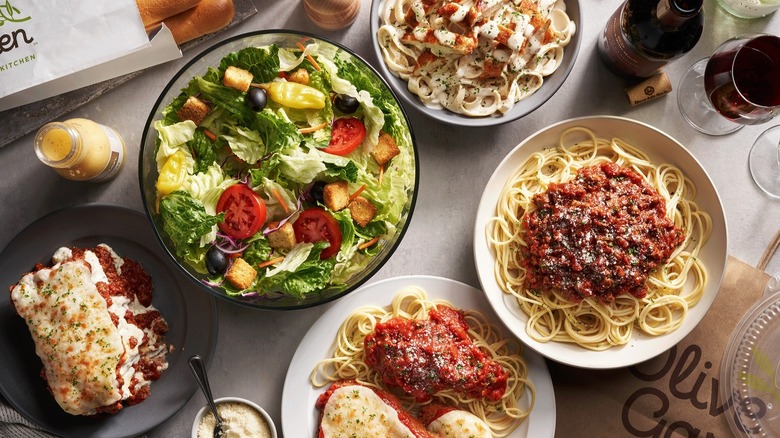A Man Is Suing Olive Garden Over Allegations Of A Rat Foot In His Soup
While the "Seinfeld" Soup Nazi might have retorted "no soup for you," one Olive Garden guest may have preferred to not place that soup order. According to a recently filed Michigan Civil Court case, Thomas Howie sued Olive Garden regarding his dining experience. The plaintiff alleges that he found a rat foot inside his minestrone soup, and he unexpectedly consumed that soup with the foreign object. The claim asserts that Olive Garden failed "to maintain premises free of vermin and the negligent preparation and service of food." Currently, the plaintiff is seeking $25,000 compensation for physical injury, mental anguish, and emotional distress.
Although the civil case was just filed, Olive Garden, through a Darden spokesperson, refuted the claims to Today.com. In a statement, the restaurant brand said that "We have no reason to believe there is any validity to this claim." It rebuts the plaintiff's claims by providing a Food Service Establishment Inspection Report as well as questioning the uncooked nature and size of the alleged foreign object. At the time of filing, the plaintiff refused to provide the offensive ingredient to Olive Garden for examination.
While the negligence lawsuit is pending in Michigan District Court, it appears that both parties had previously sought to settle this dispute. The plaintiff's attorney, Daniel Gwinn, told The Detroit News that the defendant refused to address the seriousness of the matter and his client has ongoing mental anguish from the offending dining experience. The case awaits a jury trial date.
Are foreign food ingredient lawsuits against restaurants common?
While class action lawsuits about mislabeled products and deceptive menu imagery have become common, the idea of a foreign ingredient arriving on a diner's plate is a scenario that few people want to contemplate. Although each state's laws vary, the general civil claim stems from a simple idea. Is that item, object, or ingredient not reasonably expected to be part of that dish or meal?
From a piece of glass mixed into a macaroni and cheese to a hair sitting on top of a fried egg, the scenarios are many. The situation can happen at a fast-food restaurant or a fine-dining establishment. While the splashy, almost movie-like moments get the headlines, many occurrences are quietly handled in the moment. From comping the meal to offering another form of compensation, all involved hope that the offending dish and worrisome moment will be swept away like yesterday's crumbs. When a plaintiff chooses to file in court, the claim, and its damages component, can be more significant. With more scrutiny, the evidence must prove a more than likely negligent scenario. If the plaintiff can offer that proof, they may be entitled to medical expenses, general damages, and even punitive damages.
Should diners put their food under a microscope before eating? The simple answer is no, but no one should eat any meal with their eyes closed.

